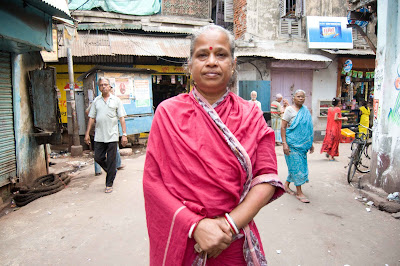This is the story of Basanti, a former sex worker from the Rambagan district, north Kolkata. A mother-of-three, now 50, she was trafficked into the area at 18 by two women from her West Bengal village 200km away.
Basanti was married off by her family when she turned 16, and gave birth to a son a year later. Her husband and his family then threw her out though, and kept the child – boys being prized in Indian society. Back home her parents didn’t want to help her, but she met a woman who said she could help her find a job in Kolkata. She never know the lady’s name – but simply called her “auntie”, as is the Indian way.
It’s a familiar story that continues to play out in impoverished communities across Asia, Eastern Europe and Africa to this day.
Basanti told me: “I thought I’d get a job cleaning houses, but she took me to Sonagachi (Kolkata’s biggest red light area). I kicked up a ruckus because I didn’t want to stay there and didn’t want to be in the profession. But she took me here to Rambagan and sold me.”
According to Basanti, that woman and her sister, who was based in Kolkata, trafficked many rural girls from her area into the city’s sex trade. Once there, they were bought by pimps and forced to see many clients a day. If they fell sick the cost of treatment was added on, as was food and shelter.
Basanti worked as a prostitute until her late 30s but now works as a domestic help, cleaning two houses every day for 800 rupees a month (about £10). Her earnings from prostitution helped her get her four younger sisters married off, but her lifestyle brought great shame on the family.
Neither of her two daughters are sex workers, something she is thankful about. It’s a difficult life, she admits – being used and abused by clients and expected to provide sexual favours for landlords, policemen and brothel owners.
And the trafficker, I asked? “She died in an accident, when the stove she was cooking on burst. Her sister also died of cholera.” Karma you could say.
And how does Basanti feel about what happened to her now? She shrugs, her eyes devoid of emotion: “It was my bad luck, my fate”.
It’s a familiar story that continues to play out in impoverished communities across Asia, Eastern Europe and Africa to this day.
Basanti told me: “I thought I’d get a job cleaning houses, but she took me to Sonagachi (Kolkata’s biggest red light area). I kicked up a ruckus because I didn’t want to stay there and didn’t want to be in the profession. But she took me here to Rambagan and sold me.”
According to Basanti, that woman and her sister, who was based in Kolkata, trafficked many rural girls from her area into the city’s sex trade. Once there, they were bought by pimps and forced to see many clients a day. If they fell sick the cost of treatment was added on, as was food and shelter.
Basanti worked as a prostitute until her late 30s but now works as a domestic help, cleaning two houses every day for 800 rupees a month (about £10). Her earnings from prostitution helped her get her four younger sisters married off, but her lifestyle brought great shame on the family.
Neither of her two daughters are sex workers, something she is thankful about. It’s a difficult life, she admits – being used and abused by clients and expected to provide sexual favours for landlords, policemen and brothel owners.
And the trafficker, I asked? “She died in an accident, when the stove she was cooking on burst. Her sister also died of cholera.” Karma you could say.
And how does Basanti feel about what happened to her now? She shrugs, her eyes devoid of emotion: “It was my bad luck, my fate”.
